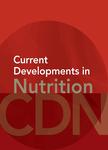版权所有:内蒙古大学图书馆 技术提供:维普资讯• 智图
内蒙古自治区呼和浩特市赛罕区大学西街235号 邮编: 010021

作者机构:Department of Nutrition Science Purdue University School of Electrical and Computer Engineering Purdue University Department of Statistics Purdue University School of Nursing Purdue University Friedman School of Nutrition Science and Policy Tufts University
出 版 物:《Current Developments in Nutrition》
年 卷 期:2020年第4卷第SUPPL 2期
页 面:4140518-4140518页
摘 要:AbstractObjectivesThe integration of time with dietary patterns throughout a day, or temporal dietary patterns (TDP), have been linked with dietary quality but links to health outcomes are unknown. TDP were created with the objective to examine their association with health status indicators including body mass index (BMI), waist circumference (WC), fasting plasma glucose, hemoglobin A1c, triglyceride, high-density lipoprotein cholesterol, total cholesterol, blood pressure, and chronic diseases obesity, diabetes, and metabolic syndrome in US adults 20–65 years. MethodsThe first-day 24-hour dietary recall from 1627 non-pregnant US adult participants of the cross-sectional National Health and Nutrition Examination Survey 2003–2006 was used to determine energy intake (kcal), time of intake (min), and sequence of intake occasions throughout the 24-hour day. Modified dynamic time warping coupled with kernel k-means algorithm, clustered participants into four groups representing distinct TDP. Multivariate regression models determined associations between TDP clusters and all outcomes, controlling for potential confounders, energy misreporting, and adjusting for multiple comparisons and the complex survey design ( P 0.05/6). ResultsThe cluster representing a TDP with proportionally equivalent average energy at three main eating occasions from 8:00 to 23:00 with peaks reaching 175 kcal at 9:00, 13:00, and 19:00, had statistically significant and clinically meaningful lower BMI ( P 0.0001), WC ( P 0.0001) and 75% lower odds of obesity compared to three other clusters representing distinct patterns of much higher average peak energy intake of 500 kcal at 13:00 (odds ratio (OR): 4.4; 95% confidence interval (CI)): 2.5, 7.9), 530 kcal at 18:00 (OR: 5.3; 95% CI: 2.8, 10.1), and 550 kcal at 20:00 (OR: 6.7; 95%CI: 3.9, 11.6). ConclusionsA positive association of the TDP of moderate energy intake throughout the day with healthy weight outcomes supports previous findings of hi